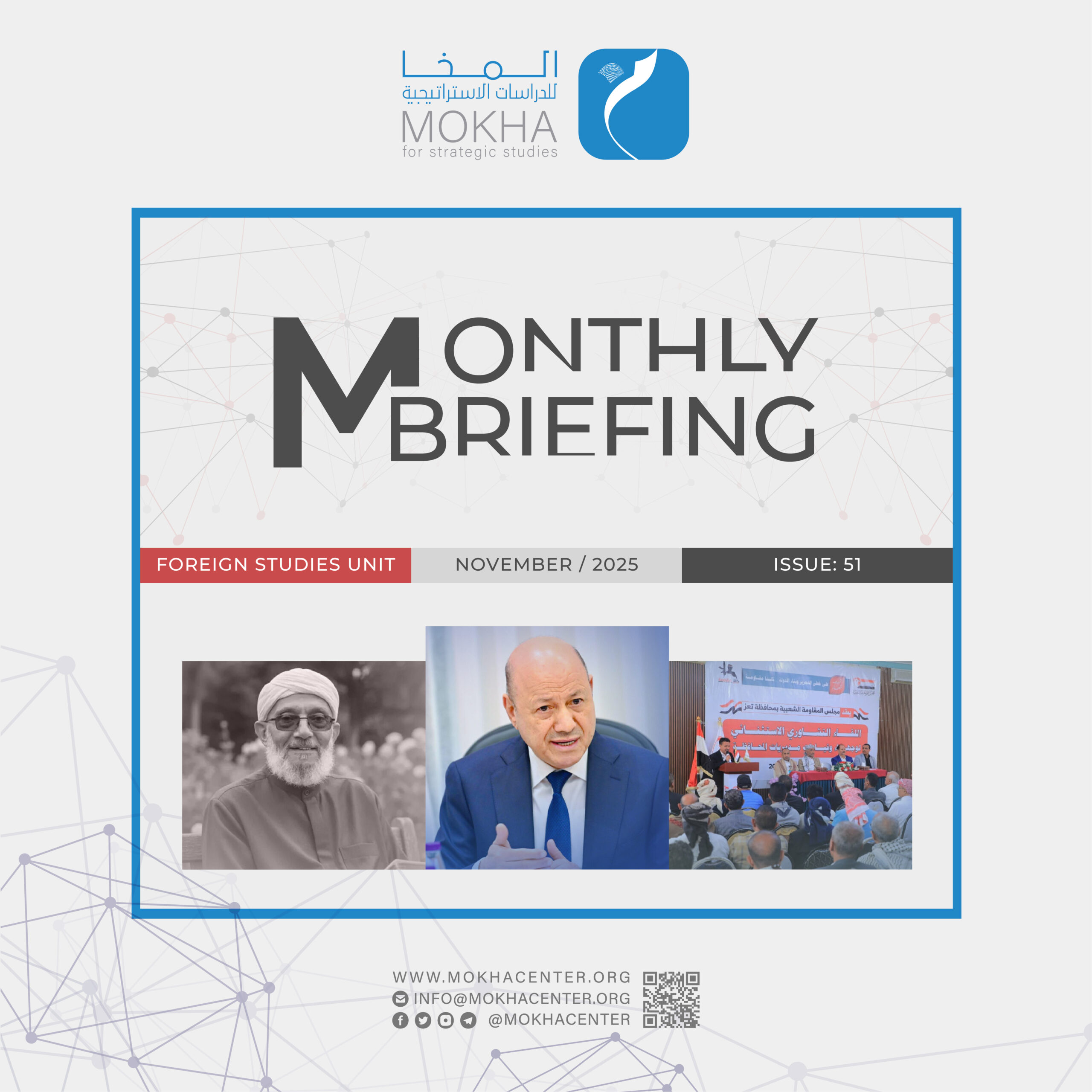Monthly Briefing/ June – 2025

Political Scene:
Throughout June 2025, the political landscape in Yemen witnessed notable diplomatic activity aimed at reinforcing support for the Presidential Leadership Council (PLC) and advancing a comprehensive settlement. However, escalating regional tensions — particularly following Houthi attacks on Israel — further complicated political efforts. Ongoing economic and military crises continued to hinder progress, underscoring the fragility of the balance between international backing and limited internal advancement.
- June 1 : Egypt’s Foreign Minister, Badr Abdel Aati, emphasized the need to resume Yemeni-Yemeni dialogue to reach a political settlement that preserves the unity of Yemen and ends the humanitarian crisis.
- June 2: The Gulf Cooperation Council (GCC) reaffirmed its support for the Presidential Leadership Council (PLC), headed by Rashad Al-Alimi, within the framework of a comprehensive political solution based on the three agreed-upon references.
- June 10: UN Special Envoy to Yemen Hans Grundberg expressed concern over Houthi missile attacks on Ben Gurion International Airport and Israel’s retaliatory strikes targeting key infrastructure in Hodeidah and Sana’a.
- June 12: Grundberg urged the UN Security Council to support the Yemeni government in resuming oil exports and facilitating the flow of goods, warning of worsening economic and humanitarian conditions in the country.
June 24: PLC President Dr. Al-Alimi chaired a meeting of the High Security Committee (HSC) and local authorities in Aden where he reviewed the latest security and economic developments and discussed strategies to combat terrorism and smuggling.
Military Scene:
June witnessed an unprecedented escalation in the military arena, extending beyond Yemen’s internal conflict to the broader regional stage. The Houthi escalation against Israel triggered a forceful international response, including Israeli and American air strikes that targeted Houthi positions and Yemeni ports. Simultaneously, internal operations intensified, with Yemeni forces thwarting Houthi attacks in Taiz and dismantling terror cells linked to both the Houthis and al-Qaeda.
- June 10: Israeli air strikes targeted Al-Hodeidah port, hitting unloading docks in retaliation for Houthi missile and drone attacks, causing significant damage to the facility.
- June 11: 461 U.S. air strikes against Houthi positions were launched as part of Operation “Iron Knight” between March 15 and May 5, 2025, killing 515 people, including 384 fighters and 131 civilians.
- June 15: Israeli warplanes attempted to assassinate Houthi Chief of Staff Mohammed Abd al-Karim al-Ghamari in a high-value operation. While an Israeli official described the strike as strategically significant if successful, the Houthis denied the report.
- June 22: Following U.S. strikes on Iranian nuclear facilities, the Houthis declared their full support for Iran, vowing to target U.S. ships and warships in the Red Sea.
- June 23: Israel intercepted a missile launched from Yemen toward Tel Aviv, amid rising Houthi missile activity against Israel since the outbreak of the Gaza war. Iran denied involvement.
June 28: The Houthis announced the resumption of missile attacks on Israel, claiming to have targeted a sensitive site in Be’er Sheva, though the Israeli military confirmed they intercepted the missile.
Security scene:
The security landscape in June 2025 revealed a stark contrast between operational successes and persistent structural challenges. On one hand, security forces demonstrated heightened vigilance — stopping a major drug-smuggling attempt at the Al-Wadiah border crossing and restoring control over the Special Forces camp in Lahj. On the other hand, incidents of military insubordination exposed weaknesses in institutional discipline, underscoring the urgent need to reinforce state authority and the rule of law.
- June 12: Al-Wadiah Border Security thwarted an attempt to smuggle over one million narcotic pills into Saudi Arabia, concealed within a refrigerated truck originating from Sana’a.
- June 24: Led by former Commander Mohammed Al-Gharabi, who refused to comply with an order for him to be dismissed, a mutiny sparked an armed standoff and security forces successfully regained control of the Special Forces camp in Lahj.
- June 27: The High Security Committee (HSC) commended the successful dismantling of a high-risk terrorist cell in Taiz. Allegedly affiliated with both the Houthis and al-Qaeda, the cell was reportedly led by Amjad Khaled, former commander of the Transport Brigade. It was implicated in a series of assassinations and bombings, including the targeted killing of a United Nations official.
Economic Scene:
The economic situation in Yemen sharply deteriorated in June, marked by a severe depreciation of the Yemeni riyal, which compounded the suffering of citizens amid rising prices and deepening living conditions. Despite the government’s reform pledges and the relocation of banks to Aden — a significant regulatory step — these measures have yet to halt the economic collapse.
- June 18: The Governor of the Central Bank of Yemen, Ahmed Al-Maabqi, announced that several banks had completed the relocation process, transferring their management, SWIFT systems and databases to Aden. He emphasized that relocation certificates are granted only after full technical verification of compliance with requirements.
- June 19: The exchange rate of the US dollar surpassed 2,750 Yemeni riyals, reaching 2,753 riyals for sale, while the Saudi riyal rose to 720 riyals, reflecting a rapid depreciation of the national currency despite the presence of the new leadership in Aden.
June 22: A UN report highlighted worsening economic and humanitarian conditions in Yemen, noting a 33% drop in the value of the riyal during May, alongside rising fuel and food prices in areas under the internationally recognized government.
Violations:
Human rights violations by the Houthi group continued to escalate throughout June, encompassing abductions, torture, extrajudicial killings and the confiscation of private property. These abuses have prompted human rights organizations to classify them as Crimes Against Humanity, calling for an independent international investigation. Thousands of violations have been documented, painting a grim picture of life in areas under Houthi control.
- June 1: The Yemeni Network for Rights and Freedoms documented 15,413 violations committed by the Houthi militia in Dhamar governorate between 2018 and May 2025. These included the murders of 474 civilians, the abduction of 1,183 individuals, cases of torture, home demolitions, property looting and the recruitment of 4,481 children, over 2,000 of whom were killed. The report highlighted widespread violations against civilians and both public and private institutions.
- June 2: The Association of Abductees’ Mothers accused the Houthis of abducting 13 citizens in Al-Hodeidah, including a female university student, and taking them to unknown locations.
- June 3: SAM Organization for Rights and Liberties revealed that a Houthi weapons depot, concealed in a residential neighborhood in Sana’a, exploded on May 22, killing and injuring over 150+ civilians, including families that were completely wiped out.
- June 2: The Media Freedoms Observatory recorded 21 violations against journalists during May, describing it as the most repressive month since the beginning of 2025. Violations included arbitrary arrests, threats and unfair trials in both Houthi-held and government-controlled areas.
- June 6: A rights report documented 400 violations committed by the Houthis during May, including killings, abductions, bombings and restrictions on freedoms in Sana’a.
- June 7: Southern Transitional Council (STC) forces, aligned with the United Arab Emirates, released Officer Hamza Al-Azibi after 10 months of detention without charge, despite previous judicial orders for his release.
- June 9: The Houthi group confiscated the assets of Save the Children in Sana’a and five other provinces, amounting to an estimated $4 million, following the organization’s announcement of its office closures in Houthi-controlled areas.
- June 26: The National Committee for Prisoners and Detainees (BCPD) denounced the systematic abuses that thousands of detainees in Houthi-run prisons experienced, describing them as crimes against humanity and confirmed the documentation of 2,388 cases of torture and 324 deaths in custody.
Humanitarian File:
Yemen continues to face a dire humanitarian crisis, marked by escalating hunger, the spread of epidemics and a collapsing healthcare system. These challenges are exacerbated by a severe lack of funding and intensified by recent U.S. air strikes, which have worsened the plight of civilians. International organizations have issued urgent warnings of an impending catastrophe.
- June 4: Human Rights Watch (HRW) reported that the U.S. air strike on Ras Issa port in Al-Hodeidah on April 17, 2025, resulted in the massacre of 84 civilians. The organization called for an immediate and impartial investigation, labeling the strike a potential war crime and urging compensation for the victims, noting that critical infrastructure was destroyed.
- June 9: King Salman Humanitarian Aid and Relief Center’s (KSRelief) MASAM Project removed 1,139 landmines, unexploded ordnance and improvised explosive devices during the first week of June, across various parts of Yemen. This was part of efforts to clear over 146,000 square meters of land. Since 2018, the project has cleared more than 337,000 explosive devices and 8,000 IEDs.
- June 14: The United Nations warned of an imminent humanitarian catastrophe in Yemen, stating that 17 million people are suffering from acute hunger and that lack of funding threatens the closure of 771 healthcare facilities.
- June 16: The World Health Organization recorded 3,900 cases of dengue fever and 14 related deaths in Aden and Lahj since January 2025. The organization launched an intensive disease-control campaign with support from the King Salman Humanitarian Center.
General News :
- June 9: Six people were killed and another was injured when an unregulated gold mine — in the village of Bani Rayban, Hajjah Governorate, northwest Yemen — collapsed. The incident highlights the dangers of unlicensed mining operations and the lack of safety oversight in remote areas.
- June 27: Yemeni poet and activist Fouad Al-Himyari passed away in Istanbul on Friday, 27 June 2025, at the age of 47, after a prolonged illness. Al-Himyari was a prominent figure in the February 11, 2011, revolution, serving as spokesperson for the youth movement and later as Deputy Minister of Information. He leaves behind a deeply influential poetic and cultural legacy.

